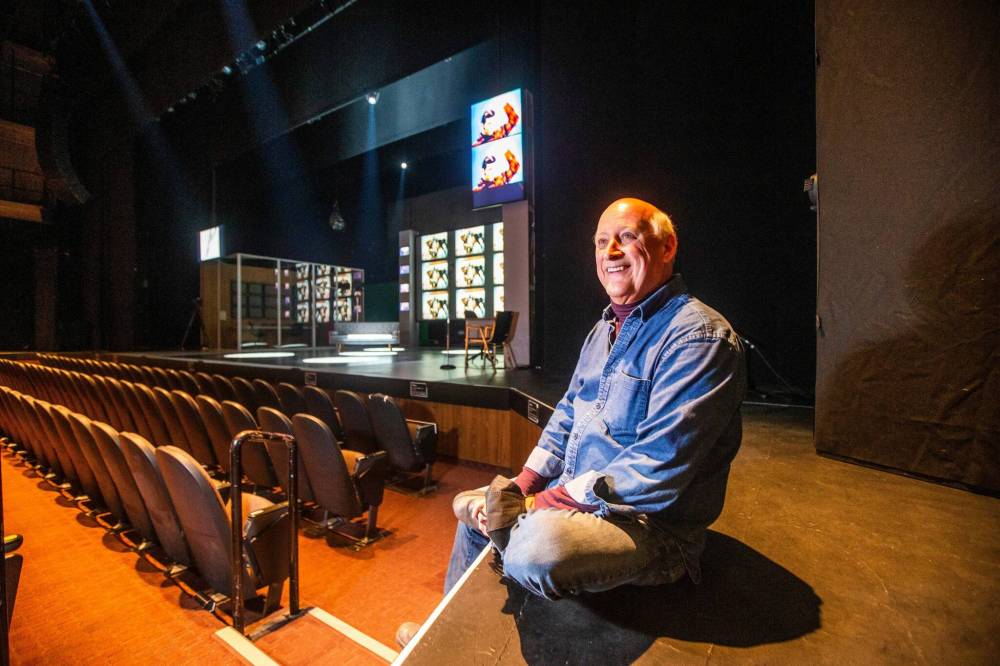Don’t touch that dial The way we consume our news has changed, but Network’s message about media remains timely
Read this article for free:
or
Already have an account? Log in here »
To continue reading, please subscribe:
Monthly Digital Subscription
$0 for the first 4 weeks*
- Enjoy unlimited reading on winnipegfreepress.com
- Read the E-Edition, our digital replica newspaper
- Access News Break, our award-winning app
- Play interactive puzzles
*No charge for 4 weeks then price increases to the regular rate of $19.00 plus GST every four weeks. Offer available to new and qualified returning subscribers only. Cancel any time.
Monthly Digital Subscription
$4.75/week*
- Enjoy unlimited reading on winnipegfreepress.com
- Read the E-Edition, our digital replica newspaper
- Access News Break, our award-winning app
- Play interactive puzzles
*Billed as $19 plus GST every four weeks. Cancel any time.
To continue reading, please subscribe:
Add Free Press access to your Brandon Sun subscription for only an additional
$1 for the first 4 weeks*
*Your next subscription payment will increase by $1.00 and you will be charged $16.99 plus GST for four weeks. After four weeks, your payment will increase to $23.99 plus GST every four weeks.
Read unlimited articles for free today:
or
Already have an account? Log in here »
Hey there, time traveller!
This article was published 18/10/2022 (1146 days ago), so information in it may no longer be current.
Paddy Chayefsky did not mean to predict the future with his script for Network.
Theatre preview
Network
Royal Manitoba Theatre Centre
• Opens Thursday, runs to Nov. 12
• Tickets at royalmtc.ca
A cynic and a realist, the celebrated screenwriter intended only to typify the problems he saw in the 1970s and in his own industry, transmitted over the airwaves and into the eyeballs of a distracted, disengaged viewing public who couldn’t see what was really happening around them — in Vietnam, in Washington and in their own backyards.
In director Sidney Lumet — who, like Chayefsky, spent the bulk of the 1950s working for news corporations only then starting to grasp their power — Network (1976) took on an extra layer of meta-criticism: the shows Lumet and Chayefsky produced had helped fill the coffers of networks like CBS and NBC, which in the postwar era began to supplant newsprint and radio as the most influential disseminators of information to the public.
As the Vietnam War and Watergate emerged as not just major news stories, but major drivers of ratings, Chayefsky recognized an undercurrent of anger burbling in America. He sought to channel that ire into a workable story about media, power, capitalism and, above all, television, which he had once described as “an indestructible and terrifying giant that is stronger than the government.”
Had Chayefsky been born a few hundred years earlier, he might have reached a similar conclusion about the printing press — that powerful tools can be misused in grotesque ways by grotesque people to achieve grotesque results.
MIKAELA MACKENZIE / WINNIPEG FREE PRESS Jim Mezon is playing Howard Beale in RMTC’s production of Network.
The film, which documents anchorman Howard Beale’s descent into madness and ascent from newsman to sweat-dripping prophet, was critically acclaimed upon its release, receiving Oscars for Lumet’s direction, Chayefsky’s script, Faye Dunaway’s turn as producer Diana Christianson and Peter Finch’s Beale, an award the Australian actor received posthumously. Vincent Canby of the New York Times remarked that the film had a quality other commercial releases lacked: “It’s alive.”
And as with the best stories, that life extends beyond the lives of its creators; Network has outlived its original self to be reincarnated on stage. This week, the broadcast comes to the Royal Manitoba Theatre Centre in a show that opens Thursday and runs to Nov. 12.
The first theatrical production of Network was mounted in 2017 in London, with Breaking Bad’s Bryan Cranston taking a seat at the anchor’s desk. Directed by Ivo Van Hove and written by Lee Hall, the production was a smash in both London and Broadway.
On the same channel
The Sidney Lumet-directed classic Network deals with themes of media, audience manipulation, the intersection of capitalism and television, and the perverting power of celebrity. Here are five other movies to check out if Network checked off your boxes.
The Sidney Lumet-directed classic Network deals with themes of media, audience manipulation, the intersection of capitalism and television, and the perverting power of celebrity. Here are five other movies to check out if Network checked off your boxes.
A Face in the Crowd (1957)
A wayward man called Rhodes (Andy Griffith) is rotting away in a prison cell until a wily radio reporter (Patricia Neal) puts her microphone in his face, beginning a chain of events that turns the convict into a multimedia superstar — teeming with endorsements and overflowing with charisma — known as Lonesome Rhodes. In this film directed by Elia Kazan and written by Budd Schulberg, who collaborated on On the Waterfront (1954), Griffith owns the screen, teetering into megalomania as the public hangs on his every word. The word Trumpian is apt.
Christine (2016)
A darker companion piece to Network that deals directly with themes of suicide, Christine follows television reporter Christine Chubbuck (Rebecca Hall) who suffers tremendously under the duress of live broadcasts and the often depressing world of TV news. Mental health and the media collide in this based-on-a-true-story film, released in 2016 but set in 1974, two years before Network’s première.
Camera Buff (1979)
A quiet factory worker living in the People’s Republic of Poland (Jerzy Stuhr) becomes a father and shoots footage of his daughter on his new 8mm camera. When word gets out that the man fancies himself a director, his overseers hire him to film a corporate celebration. As he delves further into his obsession with viewing the world through his lens, the man’s personal life begins to deteriorate in director Krzysztof Kieslowski’s morality tale about the corrosive and explosive power of film.
Quiz Show (1994)
Herbie Stempel (John Turturro) is the ultimate nerd, and for the first time in his life, it’s paying off: he’s the defending champion on the Geritol-sponsored 1950s game show Twenty-One. Upstairs at NBC, the executives (David Paymer and Hank Azaria) search for a challenger who’s a bit more suave and sophisticated to replace Herbie. Enter the spick-and-span professor Charles Van Doren (Ralph Fiennes), the son of a scholar and the cream of the East Coast crop. Meanwhile, congressional investigator Dick Goodwin (Rob Morrow) digs into rumours of a cheating scandal on the show. This fact-based film was directed by Robert Redford and shows how knowledge can be misused to manipulate the watching public.
Nightcrawler (2014)
Jake Gyllenhaal’s Lou Bloom is a pot on boil, ready at any moment to spill over. Jittery and nervous, Bloom roams Los Angeles in the middle of the night, looking for fires and car crashes to film and send to his local TV station in exchange for freelance fees. Armed with only a camera, a police scanner and a protegé (Riz Ahmed) as his assistant, Bloom begins to test the limits of journalistic integrity to boost his own profile, bank account and ever-expanding ego.
Honourable mentions: Broadcast News, Talk Radio, V for Vendetta, The Truman Show, Citizen Kane, To Die For and Being There
Director Daryl Cloran didn’t see the show, but he was still watching. In Edmonton, the director of the Citadel Theatre saw in Network a story that could work on the regional theatre level, pushing the boundaries of what audiences had come to expect. He also saw a story that felt both antiquated — an entire country watching the same broadcast? — and modern: an entire country attached to screens.
“I was blown away by its prescience,” Cloran said.
Cloran and Citadel acquired the rights prior to the pandemic, which, while ravaging the theatre industry, also reinforced one of Network’s core tenets: the power of media to shift and control both public behaviour and opinion.
While anchors today may not reach the same heights as Walter Cronkite or Edward R. Murrow, Cloran said the crew was given a reminder of the power of newsreaders the week production began in Edmonton, where the show ran before its upcoming stop in Winnipeg.
“That was right when the Lisa LaFlamme story happened,” Cloran said, referring to the longtime anchor who was removed from the national news desk for CTV because of ageism and sexism — and, ostensibly, ratings.
MIKAELA MACKENZIE / WINNIPEG FREE PRESS Winnipeg’s Jim Mezon was an amateur actor when he first saw the film version of Network in 1976.
That’s sort of what happened to Howard Beale, says Jim Mezon, the Winnipeg actor tasked with the role in the RMTC production. The story starts with Beale being let go, which triggers his anger, which triggers a ratings bonanza. In life, as in the film, the involved parties got mad as hell.
“He’s angry and he’s pissed off,” Mezon says. “He says things that upset people, but the viewers can’t stop watching. The executives see that as a potential goldmine.”
If it bleeds, it leads, and Beale is the one holding the knife.
Mezon, who was RMTC’s janitor in 1974, saw the original film at the Gaiety Theatre at the corner of Portage Avenue and Colony Street when he was a young amateur actor. “Network struck me immediately,” he says, sipping a beet smoothie. “We hadn’t seen that kind of writing before in a film script.” It was pure theatre.
The actor doesn’t watch a lot of television news — he prefers print media — but says the ideas at play in Network are no less relevant today than in 1976.
MIKAELA MACKENZIE / WINNIPEG FREE PRESS Jim Mezon will tap into news anchor Howard Beale’s anger.
“It’s all based in anger. Anger at the system. Anger that people aren’t being told the truth,” he says. “And what the television world often doesn’t give is the truth.”
Nearly 50 years after it was written, Mezon believes Network is still vital. “Nothing has changed,” he says, of the world. “The medium has changed, but the method is the same.”
That’s an apt summary for the stage adaptation, which remains loyal to Chayefsky’s original morality tale and social critique.
It’s the age-old story of the tug-of-war between truth, profit and entertainment. And it might be more relevant today than ever before in human history.
At least until tomorrow.
ben.waldman@winnipegfreepress.com

Ben Waldman covers a little bit of everything for the Free Press.
Our newsroom depends on a growing audience of readers to power our journalism. If you are not a paid reader, please consider becoming a subscriber.
Our newsroom depends on its audience of readers to power our journalism. Thank you for your support.







